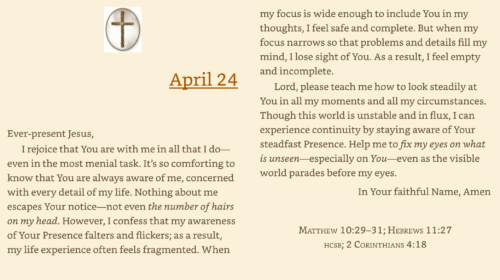The Spirituality of Letting Go
God asks only that you get out of God’s way and let God be God in you.
—Meister Eckhart, sermon on 1 John 4:9
Father Richard describes the spiritual discipline of detachment as the practice of “letting go”:
In the larger-than-life people I have met, I always find one common denominator: in some sense, they have all died before they died—and thus they are larger than death, too! Please think about that. At some point, they were led to the edge of their private resources, and that breakdown, which surely felt like dying, led them into a larger life. They went through a death of their various false selves and came out on the other side knowing that death could no longer hurt them. They fell into the Big Love and the Big Freedom—which many call God.
Throughout most of history, the journey through death into life was taught in sacred space and ritual form, which clarified, distilled, and shortened the process. Today, many people don’t learn how to move past their fear of diminishment, even when it stares them down or gently invites them. This lack of preparation for the “pass over,” the absence of training in grief work and letting go, and our failure to entrust ourselves to a bigger life, have contributed to our culture’s spiritual crisis.
All great spirituality is about letting go. Instead, we have made it to be about taking in, attaining, performing, winning, and succeeding. True spirituality echoes the paradox of life itself. It trains us in both detachment and attachment: detachment from the passing so we can attach to the substantial. But if we do not acquire good training in detachment, we may attach to the wrong things, especially our own self-image and its desire for security. [1]
Each time I learn to let go of what I thought was necessary for my own happiness, I invariably find myself in a larger place, a larger space, a deeper union, a greater joy. I’m sorry I can’t prove that to you ahead of time. We only know it after the fact. I used to read every book I could as a young man thinking if I understood good theology, good philosophy, good psychology, I’d know how to live the so-called perfect life and it would show me how to open the door in front of me. Now, in the last season of my life, I realize that what’s in front of me is still largely darkness—but it doesn’t matter anymore. That’s because letting go has taught me that I can look back, not forward, back at the past of my life and I can truthfully say, “What have I ever lost by dying? What have I ever lost by losing?” I have fallen upward again and again. By falling I have found. By letting go I have discovered, and I find myself in these later years of my life still surprised that that is true. [2]
God Is the Ground of Our Being
God is not found in the soul by adding anything, but by a process of subtraction. —Meister Eckhart, sermon on Romans 8:18
In his writings and sermons, medieval mystic Meister Eckhart (1260–1327) counseled detachment from anything that would separate us from God, whom he understood as the very ground of our being. In the latest season of his podcast Turning to the Mystics, CAC teacher James Finley shares his understanding of Eckhart’s teachings:
The guidance that Meister Eckhart offers us in his sermons attempts to help us deepen our experiential understanding of the depths of God’s presence in our lives. A foundational way that he helps us with this deepening is with his metaphor of the ground. The ground of God is the deepest depths of God. And in the generosity of God, the deepest depths of God are given to us as the deepest depths of ourselves, in our nothingness without God. Our ground and God’s ground is one ground. And hidden down in the depths of ourselves is a union that’s already present, waiting to be realized, lived, and shared. [1]
What is this path along which we can actually, experientially abide in the oneness of the ground? The path cannot be a path of attaining because nothing’s missing. The ground is this infinite generosity of God completely being given to us as this depth of ourselves. Therefore, the path has to be one of becoming detached from what hinders us from realizing it.
Eckhart is saying we can choose to live this way: in a kind of empty-handed, open process of constantly letting go of everything as having the final say in who we are. We acknowledge it [the trait, the preference, the condition], but we know it doesn’t have the final say in who we are. The more we continue in that way, we are in this Gelassenheit, which means being released from everything that hinders. A key phase of this is what Eckhart calls “the birth of the Word in the soul.” [2] What comes welling up out of the ordinariness of everything is the divinity of everything. What Eckhart is looking for is a habitual underlying state of this releasing, of this birthing. [3]
He gives some practical strategies so that we can practice finding our way to the ground in day-by-day consciousness by being sensitive to certain tendencies in our heart.
Every time we catch ourselves getting reactive, every time we catch ourselves acting as if the outcome of the situation has the authority to name who we are, we are to take a deep breath and remind ourselves that it’s not true. That there’s this hidden, unfelt, deep, abyss-like center in which we’re being unexplainably sustained in the midst of the circumstances. [4]
